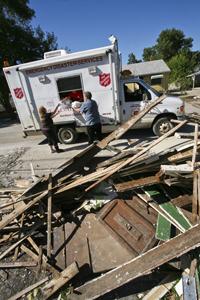Five-year anniversary of historic Minot flood
Five years ago, the biggest flood ever to strike Minot, N.D. destroyed or damaged about 4,000 homes and forced the evacuation of nearly 12,000 residents.
“One of my most vivid memories was all of the ‘stick’ houses,” recalled Captain Randy Stahl, Minot Salvation Army administrator. “The homes were stripped of everything except their wood frames and looked like stick homes.”
The water damage was so great to so many homes that their walls had to be ripped off to prevent mold from growing.
Stahl, who was appointed to lead the Minot Salvation Army last year, assisted with flood relief efforts for two weeks. He’d been deployed to Minot from western Minnesota, where he led The Salvation Army of Willmar.
Stahl is happy to have returned to Minot on a permanent basis.
“It was good to come back and see how much the town has recovered,” Stahl said. “I was here. I helped. I remember.”
He added with a laugh: “It’s good to be here under calmer circumstances.”
 Throughout the summer of 2011, The Salvation Army gave survivors more than $500,000 in direct financial assistance for food, gas, clothing and other essentials, along with more than $100,000 worth of cleaning supplies.
Throughout the summer of 2011, The Salvation Army gave survivors more than $500,000 in direct financial assistance for food, gas, clothing and other essentials, along with more than $100,000 worth of cleaning supplies.
From June 22 to Sept. 11, 2011, Salvation Army staff and hundreds of volunteers served nearly 185,000 meals and snacks, and 130,000 drinks, to thousands of flood survivors and relief workers – seven days a week.
The flood also caused a housing shortage, prompting the Federal Emergency Management Agency to bring in about 2,000 temporary housing units for flood victims. Government officials called the event a small-scale Katrina.
A moment of silence was observed in Minot at 12:57 p.m. Wednesday, June 22 to mark the minute the sirens sounded five years ago.
Officials are using state and federal funds to address pressing needs in the community, such as building ring dikes around flood-susceptible rural homes and a flood wall around Minot’s water treatment plant.
This past spring, the U.S. Army Corps of Engineers launched what will be a three-year study of permanent flood protection for the basin, an effort that could cost $1 billion.
Please join The Salvation Army by volunteering or making a donation to support your local community today.
